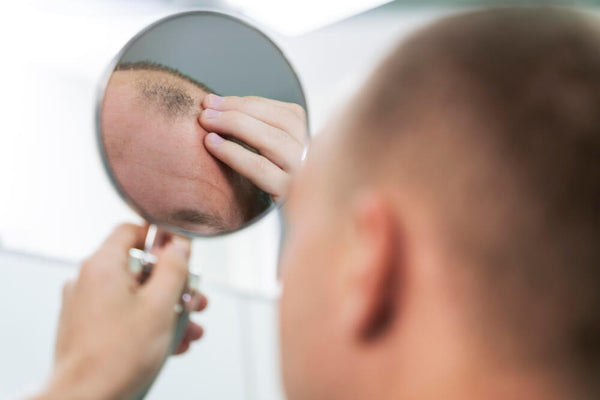That subtle itch you ignore. Those tiny flakes you brush off your shoulders. The redness you can't see under your hair. We've all been there—treating our scalp like an afterthought until the problem becomes impossible to ignore.
Here's the truth nobody tells you: your scalp sends distress signals long before your hair starts to suffer. Learning to read these signs is the difference between catching a small issue early and dealing with major hair loss later. Let's decode what your scalp tries to tell you.
When Flakes Are More Than Just Flakes
We've all seen the white specks on dark shirts. Most people call it dandruff and grab any anti-dandruff shampoo. But what if those flakes try to tell a deeper story?
True dandruff often means your scalp's natural renewal process speeds up. The skin cells shed too fast, creating those visible flakes. But here's what most miss: this acceleration usually happens for a reason. Stress can trigger it. Hormone fluctuations play a role. Even that gut issue you've been ignoring can manifest on your scalp.
The key is to notice when simple flakes change. If they become greasy or yellow, if the itching intensifies, if your scalp feels inflamed—that's when we move from basic dandruff to something that needs real attention.
That Itch You Can't Scratch Away
An itchy scalp seems minor until you find yourself scratching during important moments. That persistent itch often signals inflammation brewing beneath the surface.
Maybe it's contact dermatitis—your scalp's allergic reaction to a new product. Perhaps it's seborrheic dermatitis, where yeast overgrowth triggers redness and scaling. For many Black women, that itch comes from product buildup mixed with natural oils, creating the perfect environment for irritation.
I've had clients who scratched so much they caused open wounds that led to infections. Your scalp shouldn't itch constantly. That discomfort is a cry for help.
When Your Scalp Feels Tight and Tender
That soreness when you move your hair? The tenderness that makes you avoid certain styles? This often signals inflammation deep in the follicle level.
We see this frequently with conditions like folliculitis, where hair follicles become infected and inflamed. It also happens with CCCA, a type of scarring alopecia that disproportionately affects Black women. The early signs include scalp tenderness and pain that many women dismiss as "just a sensitive scalp."
If your scalp hurts regularly, please don't brush it off as normal. That pain is a warning sign we need to heed.
The Red Flags We Often Miss
Some scalp signals are quieter but just as important. For instance, those persistent bumps along your hairline that usually take a long time to heal. Or scaly patches that feel rough to the touch. Even that burning sensation after certain products.
These subtle signs often precede major hair issues. That slight thinning at your temples? Your scalp tried to warn you months earlier with minor inflammation you probably didn't notice.
Why Most Quick Fixes Fail
The drugstores near you often have endless solutions for scalp issues. Medicated shampoos, special oils, scalp treatments - and they all promise relief. But they often fail because they treat the symptom, not the cause.
That dandruff shampoo might control flakes temporarily, but if it is due to your gut health, the issue, the flakes will certainly return. That anti-itch treatment might soothe momentarily but if you have early CCCA, the inflammation continues to damage.
This is why at Nina Ross, we start with the why. Why is your scalp inflamed? Why is it producing excess oil? Why does it react to certain products? The answers usually lie deeper than your shampoo bottle.
How We Listen to Your Scalp
When you come to us with scalp concerns, we become detectives. We use advanced scalp imaging to see what's happening beneath the surface. We look at your overall health picture because your scalp health reflects your internal health.
Our approach might include targeted treatments to calm immediate inflammation, but we always dig deeper. We test for nutrient deficiencies, check hormone levels, assess gut health. Because a happy scalp comes from a balanced body.
We understand that Black scalps have unique needs. The products that work for straight hair often harm ours. The conditions that affect other groups hit us differently. We get the cultural context of your hair journey.
Ready to Understand What Your Scalp Says?
If you notice any of these signs—the itching, the flakes, the tenderness—don't wait until you see hair loss. Your scalp talks to you every day. Learn to listen.
We can help you understand your scalp issues and address their root causes, not just mask the symptoms momentarily. Book your Hair Therapy Evaluation for just $99 and let us help you get rid of your scalp issues for good.















